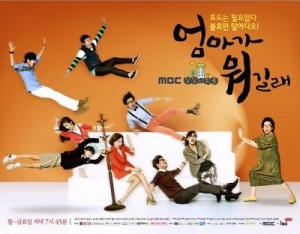 Oh MBC, you are your sudden decisions. As many of you may have heard, MBC, one of Korea’s big three broadcasters along with SBS and KBS, has recently announced a drastic decision in their direction. Not only did they cancel their daily sitcom What is Mom, but the network also announced that they would no longer continue making daily sitcoms, a very spontaneous and massive decision in the company’s part.
Oh MBC, you are your sudden decisions. As many of you may have heard, MBC, one of Korea’s big three broadcasters along with SBS and KBS, has recently announced a drastic decision in their direction. Not only did they cancel their daily sitcom What is Mom, but the network also announced that they would no longer continue making daily sitcoms, a very spontaneous and massive decision in the company’s part.
While MBC’s ultimate decision of abolishing sitcoms altogether was very dramatic and seemingly unplanned, even the cancellation of What is Mom came as a surprise. Admittedly, the show has been struggling with ratings for a while, starting off on a shaky foot and not being able to balance itself with its sub-par premise. However, being only two months old, the show was a relatively new one with plenty of room to eventually improve, making MBC’s decision all the more odd. Admittedly, even this writer couldn’t picture What is Mom getting the huge ratings boost that would have saved it from its ultimate fate; nevertheless, MBC’s decision was truly a significant one, full of deeply affecting consequences and some questionable, albeit telling, benefits.
First of all, allow me to clarify what more typical sitcoms in vein of the cancelled What is Mom were like in Korea. While those of us in the West and other parts of the world associate sitcoms with cheesy laugh tracks, ridiculous slapstick, and easy pacing (often-times free of plot entirely), Korean sitcoms differ quite a bit. The majority of Korean sitcoms seem to focus less on the comedic parts of the genre in comparison with their foreign equivalents. While many sitcoms feature some of the most comedic elements of Korean television, almost none of them choose to surround their entire premise on comedy, which is what most other international sitcoms tend to do.
 Instead, Korean sitcoms tend to appear more like age appropriate family dramas, being very plot-driven and even melodramatic at moments. Unlike an episode of Friends or Seinfeld where you can randomly tune in to an episode and not get lost due to the shows’ episodic natures, you cannot do the same for most sitcoms. Rather, in Korean sitcoms, it is sometimes necessary to tune in periodically to the show to have even an inkling of what’s going on, contrasting very much from the laidback pacing of most other sitcoms. The only real, consistent similarity between Korean sitcoms and the other sitcoms of the world is the smaller time frame of approximately 30 minutes, and even this one factor can get deviated by sitcoms’ producers. With its more serious, plot-oriented tone, one can easily liken Korean sitcoms to stripped down versions of the much more popular K-dramas. The main differences between K-dramas and sitcoms are that sitcoms tend to have lower time frames, lower production budgets, and daily episodes and filming, though sitcoms also traditionally feature a higher episode count, a bigger cast, and more family-friendly topics as well.
Instead, Korean sitcoms tend to appear more like age appropriate family dramas, being very plot-driven and even melodramatic at moments. Unlike an episode of Friends or Seinfeld where you can randomly tune in to an episode and not get lost due to the shows’ episodic natures, you cannot do the same for most sitcoms. Rather, in Korean sitcoms, it is sometimes necessary to tune in periodically to the show to have even an inkling of what’s going on, contrasting very much from the laidback pacing of most other sitcoms. The only real, consistent similarity between Korean sitcoms and the other sitcoms of the world is the smaller time frame of approximately 30 minutes, and even this one factor can get deviated by sitcoms’ producers. With its more serious, plot-oriented tone, one can easily liken Korean sitcoms to stripped down versions of the much more popular K-dramas. The main differences between K-dramas and sitcoms are that sitcoms tend to have lower time frames, lower production budgets, and daily episodes and filming, though sitcoms also traditionally feature a higher episode count, a bigger cast, and more family-friendly topics as well.
So with a sitcom properly defined, what drove MBC to cancel all their sitcoms, and what factors made this decision so much more surprising? Well for one, in MBC’s justification, other than the previously mentioned What is Mom, MBC’s other recent sitcoms haven’t been doing that well either, with the network’s unsuccessful project Standby being a good example. Furthermore, representatives from MBC have stated sitcoms’ decline in demand as part of their reasoning to halt their sitcom production henceforth. And this statement speaks some unfortunate truth. Compared to the past, the success of sitcoms have been continuously declining, with the smaller shows losing out to the more renowned K-dramas. And lastly, even if sitcoms had lower budgets, they were still costly and painstaking to film. In particular, sitcoms’ daily filming would prove to be a big hassle to networks, actors, and fickle viewers alike, the more spaced out scheduling of a K-drama being much more favorable. So considering all those factors, MBC’s final decision really shouldn’t appear spontaneous or rash.
 However, considering the circumstances, it could just as easily be argued that MBC’s decision was a thoughtless and unplanned one. For one, while they’ve hit a major slump, MBC is the originator of multiple successful sitcoms. From the lengthy Nonstop series to be widely popular High Kick! trilogy, MBC saw its fair share of success with its sitcoms, its projects giving birth to some of today’s more renowned stars, namely Kim Bum, Jung Il-woo, Shin Se-kyung, Hwang Jung-eum, and many more. Considering their previous success with the genre, many thought MBC still had it in them to finally make a good sitcom again had they not halted all sitcom production on the network.
However, considering the circumstances, it could just as easily be argued that MBC’s decision was a thoughtless and unplanned one. For one, while they’ve hit a major slump, MBC is the originator of multiple successful sitcoms. From the lengthy Nonstop series to be widely popular High Kick! trilogy, MBC saw its fair share of success with its sitcoms, its projects giving birth to some of today’s more renowned stars, namely Kim Bum, Jung Il-woo, Shin Se-kyung, Hwang Jung-eum, and many more. Considering their previous success with the genre, many thought MBC still had it in them to finally make a good sitcom again had they not halted all sitcom production on the network.
Secondly, a recent sitcom (that infatuated this writer to the point of obsession) recently proved that a sitcom could do well, contrasting greatly with the representative’s beliefs. Of course I am talking about Answer Me 1997, the little sitcom that took the K-pop sphere by storm. The sitcom broke many records for cable television and overall proved to be a worthwhile watch despite its more humble sitcom status. Admittedly, Answer Me 1997 was a project belonging to another network, tvN, known for their great track record in dramas, but considering the high popularity the drama reached through word of mouth alone, you would think MBC would want to ride on that success and follow the trend by continuing with their sitcoms.
Ultimately, though, despite all the past success that suggests otherwise, the sitcom market is a gradually declining demographic, and as unfortunate and rash MBC’s decision may have been, I cannot deny the reasoning behind their decisions. MBC also suddenly cancelled long-lasting variety show (hosted by renowned MCs and my favorites Yoo Jae-suk and Kim Won-hee) Come to Play for similar reasons as What is Mom, using the declining ratings as their justification. These drastic measures suggest MBC is aiming for a major shift in direction in their network, and while it is too early to tell whether these changes would end up in their favor or not, here’s hoping MBC gets out of this ordeal with minimal damage.
Readers, what do you think of MBC’s major decisions?
(Dramabeans, Star News, TVReport, Nate, MBC, tvN)


